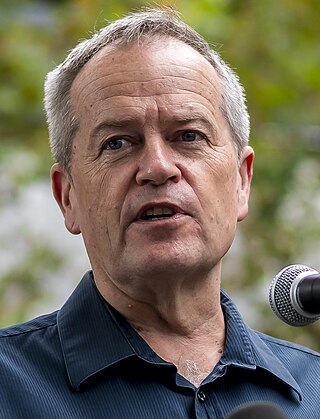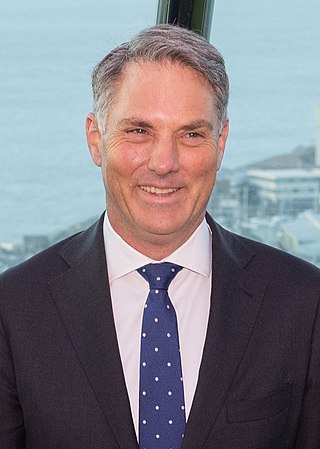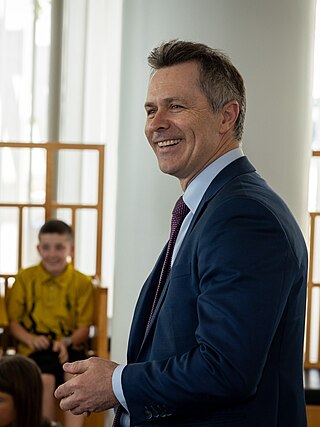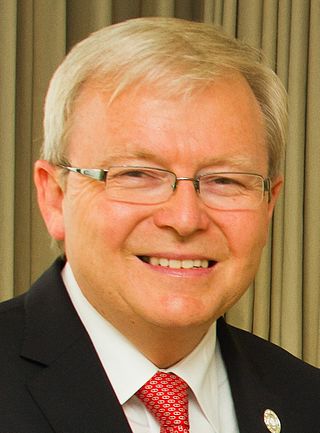
Anthony Norman Albanese is an Australian politician serving as the 31st and current prime minister of Australia since 2022. He has been leader of the Australian Labor Party (ALP) since 2019 and the member of parliament (MP) for Grayndler since 1996. Albanese previously served as the 15th deputy prime minister under the second Kevin Rudd government in 2013, and held various other ministerial positions in the governments of Kevin Rudd and Julia Gillard from 2007 to 2013.

In Australian federal politics, the Leader of the Opposition is an elected member of parliament (MP) in the Australian House of Representatives who leads the opposition. The Leader of the Opposition, by convention, is the leader of the largest political party in the House of Representatives that is not in government.

Brendan Patrick O'Connor is an Australian politician who has served as Minister for Skills and Training since 2022. He is a member of the Australian Labor Party (ALP) and has served in the House of Representatives since 2001. He held ministerial office in the governments of Kevin Rudd and Julia Gillard from 2007 to 2013, including as a member of cabinet from 2012 to 2013. He was a member of the shadow cabinet from 2013 to 2022.

Tanya Joan Plibersek is an Australian politician who served as Deputy Leader of the Labor Party and Deputy Leader of the Opposition from 2013 to 2019. She has served as the Member of Parliament (MP) for Sydney since 1998. A member of the Labor Party, Plibersek served as a Cabinet Minister in the Rudd, Gillard and Albanese governments. She is currently the Minister for the Environment and Water in the Albanese ministry since 2022, having previously served as the Shadow Minister for Education and Shadow Minister for Women between 2019 and 2022.

Penelope Ying-Yen Wong born 5 November 1968) is an Australian politician who is currently serving as the minister for Foreign Affairs and leader of the Government in the Senate in the Albanese Government since 2022. A member of the Australian Labor Party (ALP), she has been a Senator for South Australia since 2002. Wong previously served as Minister for Climate Change and Minister for Finance and Deregulation during the governments of Prime Ministers Kevin Rudd and Julia Gillard from 2007 until 2013.

Christopher Eyles Guy Bowen is an Australian politician who has been Minister for Climate Change and Energy in the Albanese government since June 2022. He is a member of the Australian Labor Party (ALP) and was first elected to parliament at the 2004 federal election. He held ministerial office in the Rudd and Gillard governments from 2007 to 2013.

The leader of the Australian Labor Party is the highest political office within the federal Australian Labor Party (ALP). Leaders of the party are chosen from among the sitting members of the parliamentary caucus either by members alone or with a vote of the party’s rank-and-file membership. The current leader of the Labor Party, since 2019, is Anthony Albanese, who has served as the prime minister of Australia since 2022. There have been 21 leaders since 1901 when Chris Watson was elected as the inaugural leader following the first federal election.

William Richard Shorten is an Australian politician and former trade unionist currently serving as Minister for Government Services and Minister for the National Disability Insurance Scheme since 2022. He previously served as leader of the opposition and leader of the Australian Labor Party (ALP) from 2013 to 2019. He has also served as a member of parliament (MP) for the division of Maribyrnong since 2007, and held several ministerial portfolios in the Gillard and Rudd governments from 2010 to 2013.

Richard Donald Marles is an Australian politician who has been deputy prime minister of Australia and Minister for Defence in the Albanese government since 2022. He has been deputy leader of the Australian Labor Party (ALP) since 2019.

Clare Ellen O'Neil is an Australian politician who is the Minister for Home Affairs and Minister for Cyber Security, since 2022. She is a member of the Australian Labor Party (ALP) and has been a member of the House of Representatives since 2013, representing the Victorian seat of Hotham.

Jason Dean Clare is an Australian politician serving as Minister for Education since 1 June 2022. He is a member of the Australian Labor Party (ALP) and has represented the Division of Blaxland in Western Sydney since 2007.

Michelle Anne Rowland is an Australian politician. She is a member of the Australian Labor Party (ALP) and has represented the Division of Greenway in the House of Representatives since 2010. She was a member of the shadow ministry from 2013 to 2022, and was elected President of the Australian Labor Party in October 2021. She is now the Minister for Communications in the government of Anthony Albanese following the ALP's victory in the 2022 Australian federal election.

A leadership spill in the Australian Labor Party, the party then forming the Government of Australia, took place on 26 June 2013 at 7:00pm AEST. Prime Minister Julia Gillard called a ballot for Leader and Deputy Leader of the Labor Party live on Sky News Australia at 4:00pm, following persistent leadership tensions. She stated that she would retire from politics if she lost the vote, while calling on any would-be challengers to pledge to do the same if they lost. In a press conference held shortly after Gillard's announcement, backbencher and former Prime Minister Kevin Rudd announced that he would challenge Gillard, whilst also pledging to step down if he did not win the vote. At the ALP caucus meeting, Rudd was elected Leader of the Labor Party, with the caucus voting 57–45 in his favour.

The second Rudd government was the federal executive Government of Australia led by Prime Minister Kevin Rudd of the Australian Labor Party. It commenced on 27 June 2013 and ceased on 18 September 2013. Rudd had previously served a term as Prime Minister from 2007 to 2010 and been replaced by his deputy Julia Gillard, following an internal party spill. Rudd regained the Labor Party leadership by successfully re-challenging Gillard in a June 2013 party spill. On 5 August, Rudd called an election for 7 September 2013, which resulted in the defeat of his government by the Liberal/National Coalition led by Opposition Leader Tony Abbott.

A leadership election was held in October 2013 to select Kevin Rudd's replacement as leader of the Australian Labor Party and Leader of the Opposition. Bill Shorten was elected party leader, and Tanya Plibersek was later confirmed as deputy leader.
The Shadow Ministry of Bill Shorten was the opposition Australian Labor Party shadow ministry from October 2013 to May 2019, opposing the Abbott government, Turnbull government and Morrison government.

James Edward Chalmers is an Australian politician. He has been Treasurer of Australia in the Albanese government since May 2022. He is a member of the Australian Labor Party (ALP) and has served as a member of parliament for the division of Rankin since 2013.
An election for the leadership of the New South Wales branch of the Australian Labor Party was held between 7 and 29 June 2019. The election was triggered by the resignation of Leader Michael Daley on 25 March 2019. The election was a combined vote by the party membership and the Labor members of the Parliament of New South Wales, with each component weighted equally. The party members were sent their ballots on 7 June and had until 21 June to return them, while the parliamentary caucus met on 29 June to cast their votes.

The Albanese ministry is the 73rd ministry of the Government of Australia. It is led by the country's 31st Prime Minister, Anthony Albanese. The Albanese ministry succeeded the second Morrison ministry, which resigned on 23 May 2022 following the federal election that took place on 21 May which saw Labor defeat Scott Morrison's Liberal–National Coalition.

The Albanese government is the federal executive government of Australia, led by Prime Minister Anthony Albanese of the Australian Labor Party. The Albanese Government commenced on 23 May 2022, when Albanese and an interim ministry of four other Labor MPs were sworn into their relevant ministerial portfolios by the Governor-General of Australia. The government is composed of those members of the Labor Party elected to the current parliament who have been chosen as ministers. The party initially governed with 77 seats on the floor of the House of Representatives, enough for a two-seat majority. Albanese succeeded the Scott Morrison-led Liberal/National Coalition government (2018–2022), which became unable to continue in government following their defeat in the 2022 federal election. This is the first Labor government to be in office at the federal level since the second Rudd government was defeated by the Coalition at the 2013 election. Deputy Labor leader Richard Marles is serving as Deputy Prime Minister of Australia.

















